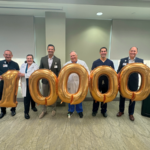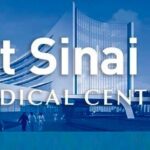 Our healthcare industry has begun a difficult and lengthy transition from an increasingly outdated system of healthcare delivery to a new national priority for affordable health care. This requires health administrators to lower the individual costs of care, while openly demonstrating that high-quality care is, in fact, being provided for 44 million previously uninsured Americans. In addition, new services are also being demanded in areas such as mental health, disease prevention, and the growing impact of violence in our communities.
Our healthcare industry has begun a difficult and lengthy transition from an increasingly outdated system of healthcare delivery to a new national priority for affordable health care. This requires health administrators to lower the individual costs of care, while openly demonstrating that high-quality care is, in fact, being provided for 44 million previously uninsured Americans. In addition, new services are also being demanded in areas such as mental health, disease prevention, and the growing impact of violence in our communities.
These new demands on our system are requiring leaders in graduate education to “rethink” the more traditional approaches to preparing healthcare executives. This critical self-assessment has led to a much more hands-on approach to executive development, enabling the student to quickly move beyond the traditional management text book to team problem-solving in complex real-world management situations.
To further accelerate the learning process, the Lake Erie College of Osteopathic Medicine (LECOM) Masters in Health Science Administration (MHSA) curriculum provides opportunities for students to apply new problem-solving skills learned from other industries. An example is the insights gained from the application of “Lean” methodologies to the redesign of our healthcare delivery systems. This innovative approach to leadership was originally developed in Japan, resulting in the Toyota Motor Company becoming the world leader in the large-scale manufacture of low-cost, high quality automobiles for the American driver.
In short, “Lean Thinking” has produced a superior executive.
Since the introduction of Lean know-how into American businesses, it has become a benchmark for excellence in companies as diverse as Boeing Aircraft, Ford Motor Company, and Microsoft. The Lean approach has now been introduced into American healthcare delivery system, with dramatic improvements, including reducing the incidence of medication-related errors in large provider organizations by as much as 67% in less than two years.
The transformation of our healthcare system will require the emergence of transformational leaders who are capable of envisioning and leading US healthcare into a new future. LECOM’s MHSA program is committed to a leadership role in developing this new brand of leader.
The goal of the LECOM MHSA program is to enable the student to make the transition from committed learner to a results-oriented leader in as few as eighteen months.
To achieve this accelerated self-development plan, the MHSA faculty has created a blended approach to leadership development which combines four distinct learning experiences:
1. Management Theory: A comprehensive understanding of the principles of management in areas such as verbal and written communications and employee motivation, focusing specifically on healthcare issues and problems.
2. Technology Transfer: An in-depth exposure to cutting-edge analytical and team-building skills learned from other industries and applied to improving the value of health services through lower costs, improved accessibility, and better quality of care.
3. Team Problem-Solving: A highly focused approach to interdisciplinary problem-solving through increasingly complex case studies developed from our faculty’s personal experiences and incorporated into a unique “Capstone Experience”.
4. Real-World Learning: A carefully designed MHSA Internship through which a faculty mentor guides each student through an individualized hands-on “discovery” process in a provider organization, carried out in a distance learning environment.
Through these blended learning experiences, the student quickly develops important new leadership skills in such areas as project organization, team problem-solving, financial management, marketing, strategic planning, and written and verbal communications.


























